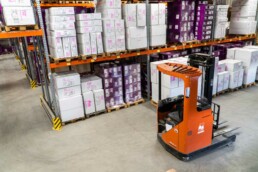E-commerce Fulfillment Infrastructure that Scales
As an e-commerce business owner you are well aware of the ups and downs that coming with running a successful company. When you first launch a business you can get by with manual effort and a small team, however as you scale systems, processes, and thoughtful partners are needed to grow. In this article we are going to cover five key elements of e-commerce fulfillment infrastructure that scales as you grow.
Warehousing

Warehousing is the physical space where inventory is stored and distributed for e-commerce fulfillment. Ample storage space is a crucial component in fulfillment infrastructure that will scale. The importance of good warehousing cannot be understated. It facilitates efficient inventory management. Adequate space allows easier and faster inventory intake, storage, and order fulfillment. It provides enough room for a clean and organized stock room where products are easier counted and found as orders are received. Alternatively, inventory management becomes cramped, chaotic, and ineffective when a company lacks warehouse space. Deficient warehouse space increases the risk of stock damage, inventory shrinkage, and incorrect product reporting. As a result, customer experience is threatened.
Inventory Management Systems

Inventory management plays a significant role in meeting and exceeding customer expectations. Businesses can keep track of their inventory levels and orders in real-time. Many inventory management systems integrate with standard POS systems. It is possible to track inventory manually, but it isn’t scalable. To build a fulfillment infrastructure that scales, it is necessary to invest in an inventory management system that has the following capabilities:
- Lot and serial tracking
- Shipping and Receiving
- Barcoding and Scanning
- Label Generation
- Mobile Accessibility
- Reporting Capabilities
While these features should be available in most inventory management systems, also consider your needs. Do you want to automate inventory management processes? Do you need a Saas program or on-premise, or both? Regardless of which system you select, ensure that it will meet your current needs and provide expansion possibilities.
Shipping Platforms

Logistics or shipping platforms have become widely used by businesses of all sizes because they offer vital insight and cost savings. Online shipping platforms are used to compare shipping rates, label printing and tracking services, and other logistics services. They can help meet ever-growing customer demands, boost revenue growth, and help to stay competitive. Implementing an advanced shipping system can help you find the right carrier service at the lowest cost. Additional benefits include: streamlining transportation by leveraging zone skipping, managing compliance issues, tracking and resolving delivery problems in real-time, and helping make data-informed decisions with ease.
Payment Processors

These platforms facilitate online payments from customers, such as credit cards and online banking services. Basically a payment processor is a mediator between the merchant and the bank by managing credit card transactions. It validates and authorizes payments by ensuring that the buyer has enough funds and that the card they use is valid for transferring the funds into the seller’s account. Additional benefits of using a quality payment processor:
- Allows retailers to accept debit and credit card transactions
- Offers alternative payment methods like PayPal or Apple Pay
- Integrates with your POS systems
- Ensures customer payments are properly validated
Every e-commerce business will need a solid payment processor and an integrated payment gateway to capture sales and refunds when necessary.
Returns and Refunds Management

Returns management, also known as reverse logistics, involves the same steps as “forward” logistics and therefore requires similar processes. Therefore, investing in returns management systems allows businesses to seamlessly process returns and refunds, including tracking and communication with customers regarding their orders. Handling returns well improves overall customer satisfaction, provides for faster turnaround, reduces waste, and can improve profitability.
Beginner’s Guide to Third-Party Logistics (3PL)
The world of e-commerce is always changing, understanding the roll of Third-Party Logistics is integral to keeping up. This beginner’s guide to third-party logistics (3PL) will delve into the essential aspects, offering insights into fulfillment services, warehousing, and much more.
Read More…
Build E-commerce Fulfillment Infrastructure that Scales with a 3PL
Almost all of the systems and infrastructure pieces mentioned above are available through a quality 3PL partner. Not only can a 3PL provide ample warehousing, but they often allow flexibility in scaling up and down with storage, so you only pay for what you need. Additionally, a 3PL typically offers high-tech inventory management systems that include barcoding, WMS, shipping, and receiving. A fulfillment company like Falcon Fulfillment will leverage the most advanced shipping processing to reduce costs, expedite deliveries, and ensure proper labeling and compliance. Your business could also benefit from a more comprehensive network of carriers and lower shipping costs due to volume discounts. Similarly, even returns management can be bundled into your 3PL logistics offering.





